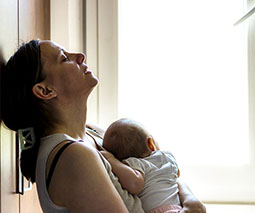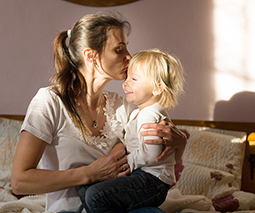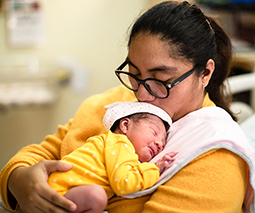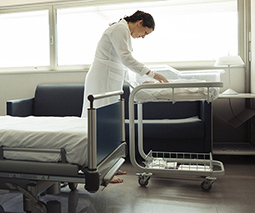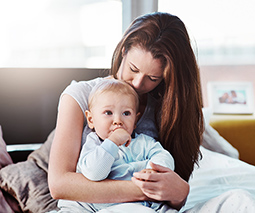Chrissy Teigen’s essay on postnatal depression is a must-read for all parents

Postnatal depression is indiscriminate. It affects women and men from all walks of life and can be carving a destructive path in even the most idyllic-seeming families, as Chrissy Teigen illustrates.
Smart cookie
Chrissy Teigen is a cheeky, gorgeous, super-entertaining woman and we find it so chortle-inducing following her on social media. Not only is she whip-smart and politically engaged, she’s obviously really besotted by husband John Legend and daughter Luna. It’s a delight to behold.
Teigen is also acutely aware of her ‘charmed life’, at pains to note how lucky she is any time she talks about the challenges of motherhood/life and issuing a kind of ‘privilege disclaimer’ before she speaks about her experience of parenting.
Rich girl problems?
She recently issued her own privilege check when she spoke frankly about the amount of support she receives from her family and hired help, to keep the Chrissy Teigen wagon on track. She paid tribute to women who parent without the same level of assistance or financial security saying “I just don’t know how anyone does it.”
This carefully-worded tribute to other mums came hot on the heels of recent criticism of the way she’d chosen to approach IVF treatment – in particular that she and John may have chosen the gender of their baby/s.
We’re guessing this constant stream of outrage is why she’s never spoken about her experience of postnatal depression before – and can’t be helping her anxiety any.
The cries of ‘rich girl problems’ are persistent and very, very shouty. Assertions that she could not possibly have real problems or that she’s whinging are pretty relentless too.
Mum advocate
Luckily, she presses on and does her best to shake off the criticism, live her best life and open up dialogue on parenting’s challenges, for the benefit of other mums and dads.
For instance, she’s just written a very relatable and heartfelt essay for Glamour magazine, revealing her experience of postpartum depression after having Luna last year.
Again, the essay is dotted with self-imposed privilege awareness, but it also describes the kind of distressing and familiar symptoms of PND that many, many women (and men) endure. Because Grammy invitations and private jets can not guard against this insidious condition.
Teigen says that when she returned to work when Luna was still pretty tiny, her coworkers made the workplace extra welcoming and mum-friendly. Their efforts didn’t go unnoticed, but of course could not shake her from the grip of PND. If only it was that simple.
“My eyes would well up and I would burst into tears. My makeup artist would pat them dry and give me a few minutes. I couldn’t figure out why I was so unhappy. I blamed it on being tired and possibly growing out of the role: “Maybe I’m just not a goofy person anymore. Maybe I’m just supposed to be a mom,” Chrissy wrote.
“I never left the house”
At home, things felt terrible too. Teigen says she didn’t leave the house, unless she had a work commitment that day. She couldn’t eat properly. She only wanted to sleep on the couch, unable to make it upstairs. She was in physical pain. She kept bursting into tears.
“When I wasn’t in the studio, I never left the house. I mean, never. Not even a tiptoe outside. I’d ask people who came inside why they were wet. Was it raining? How would I know—I had every shade closed. Most days were spent on the exact same spot on the couch and rarely would I muster up the energy to make it upstairs for bed. John would sleep on the couch with me, sometimes four nights in a row. I started keeping robes and comfy clothes in the pantry so I wouldn’t have to go upstairs when John went to work. There was a lot of spontaneous crying,” she confessed.
The way forward
When she finally got her PND diagnosis, things began to turn around. Getting some answers and medical support and the right treatment have made all the difference.
“Before the holidays I went to my GP for a physical. John sat next to me. I looked at my doctor, and my eyes welled up because I was so tired of being in pain. Of sleeping on the couch. Of waking up throughout the night. Of throwing up. Of taking things out on the wrong people. Of not enjoying life. Of not seeing my friends. Of not having the energy to take my baby for a stroll. My doctor pulled out a book and started listing symptoms. And I was like, “Yep, yep, yep.” I got my diagnosis: postpartum depression and anxiety. (The anxiety explains some of my physical symptoms)” Teigen wrote.
“As I’m writing this, in February, I am a much different human than I was even just in December. I’m over a month into taking my antidepressant, and I just got the name of a therapist who I am planning to start seeing. Let’s be honest though—I probably needed therapy way before Luna! Like anyone, with PPD or without, I have really good days and bad days. I will say, though, right now, all of the really bad days—the days that used to be all my days—are gone.”
Brave move
Whatever your thoughts on Teigen, this essay is a really brave and generous move from her.
We see our own stories in the stories of others and there are most definitely thousands and thousands of women (and men) across the globe who are enduring the same struggle that Chrissy describes – and toughing it out alone.
Not only does realising how universal PND and other forms of depression and anxiety are help to destigmatise these conditions, her frank and detailed reveal might just encourage others to reach out to someone for much-needed help.
Our opinion of CT just went up a few more notches (and we already kind of loved her a LOT!)
Here’s hoping she’s resilient enough to keep sharing the stuff that connects and helps other parents.
You can read Chrissy’s full essay over at Glamour.
If you or someone you know is showing symptoms of PND – please don’t be afraid to reach out. PANDA are waiting for your call and want to help.

